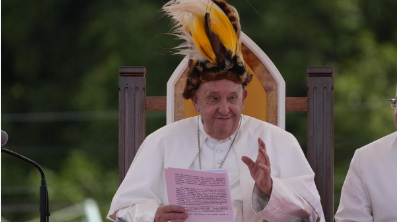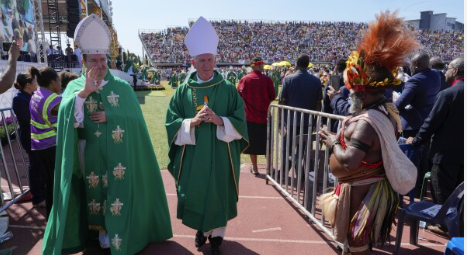In a momentous occasion for both the Vatican and the people of Papua New Guinea, Pope Francis has made a historic visit to the remote jungles of Papua New Guinea, bringing with him a substantial shipment of humanitarian aid and toys. This visit marks a significant chapter in the Pope’s ongoing efforts to address global inequality, promote peace, and extend compassion to the world’s most underserved communities. This article provides a detailed account of the Pope’s visit, the humanitarian efforts undertaken, and the broader implications for the local community and international relations.
Arrival in the Heart of the Jungle
1. The Setting: Papua New Guinea’s Remote Jungles
Papua New Guinea, an island nation located in the southwestern Pacific Ocean, is known for its diverse cultures, languages, and geography. The country’s remote jungles are home to many indigenous communities who live in isolation from urban centers. These areas often face challenges such as limited access to basic services, healthcare, and education.
The visit by Pope Francis to these remote areas represents a profound gesture of solidarity and support. The jungles, with their lush landscapes and isolated villages, present both logistical challenges and symbolic significance for this humanitarian mission.
2. The Pope’s Journey
Pope Francis arrived in Papua New Guinea with a mission to bring hope and assistance to those in need. His arrival was marked by a sense of anticipation and excitement among local communities, who greeted him with traditional ceremonies and expressions of gratitude.
The Pope’s journey to the remote regions involved navigating difficult terrains and overcoming logistical hurdles. His determination to reach these isolated communities underscores his commitment to addressing global inequalities and reaching out to the most marginalized.  for more information click on this link
for more information click on this link
Humanitarian Aid: A Lifeline for Remote Communities
1. The Shipment of Aid
One of the central aspects of the Pope’s visit was the delivery of humanitarian aid. The shipment included essential supplies such as food, medical equipment, and clothing. This aid is intended to address immediate needs and provide relief to communities struggling with limited resources.
The aid was carefully coordinated with local organizations and authorities to ensure it reached those most in need. The distribution of supplies was carried out with the support of local volunteers and relief workers, who played a crucial role in managing the logistics of the operation.
2. Distribution and Impact
The distribution of humanitarian aid had a significant impact on the local communities. Families received much-needed food supplies and medical assistance, which will help alleviate some of the challenges they face. The arrival of the aid also brought a sense of hope and reassurance to the communities, highlighting the global commitment to their well-being.
In addition to the immediate relief provided by the aid, the visit also served to raise awareness about the conditions faced by these remote communities. The Pope’s presence drew international attention to their needs and underscored the importance of continued support and assistance.
A Joyful Gesture: Toys for Children
1. Bringing Joy and Smiles
As part of his visit, Pope Francis also brought a substantial shipment of toys for children living in the remote jungles. The toys, which included educational materials, games, and playthings, were selected to bring joy and comfort to the young residents.
The distribution of toys was met with overwhelming excitement and happiness from the children. For many, this was the first time they had received such items, and the toys provided a welcome distraction from the hardships they face.
2. Symbolism and Significance
The gesture of bringing toys for children carries profound symbolism. It reflects the Pope’s commitment to addressing the needs of the youngest and most vulnerable members of society. By providing toys, the Pope aimed to offer not just material relief but also emotional and psychological support.
The toys also serve as a reminder of the importance of investing in the well-being and development of children. Ensuring that children have access to educational and recreational resources is crucial for their growth and future prospects.
The Pope’s Message: Solidarity and Compassion
1. A Message of Unity
Pope Francis’s visit to Papua New Guinea was accompanied by a powerful message of unity and solidarity. In his speeches and interactions with local communities, the Pope emphasized the importance of coming together to support one another and address global inequalities.
His message resonated strongly with the local population and reinforced the values of compassion and empathy. The visit served as a reminder of the shared humanity that connects people across different cultures and regions.
2. Addressing Global Challenges
The Pope’s visit also highlights the broader global challenges of poverty, inequality, and access to basic services. By focusing on remote and underserved communities, the Pope aimed to draw attention to the disparities faced by these populations and advocate for more comprehensive and sustainable solutions.
The humanitarian efforts undertaken during the visit are part of a larger mission to promote social justice and support marginalized communities. The Pope’s actions reflect his commitment to addressing these challenges and fostering a more equitable and compassionate world.
Local and International Reactions
1. Local Community Response
The response from the local communities in Papua New Guinea was one of profound gratitude and appreciation. The Pope’s visit was seen as a significant gesture of support and solidarity, and the humanitarian aid provided tangible benefits to those in need.
Local leaders and residents expressed their appreciation for the Pope’s efforts and highlighted the positive impact of the aid on their daily lives. The visit also fostered a sense of connection and recognition, reinforcing the importance of global support for remote and underserved communities.
2. International Impact
The Pope’s visit to Papua New Guinea garnered international attention and generated positive media coverage. The focus on humanitarian aid and the well-being of remote communities contributed to a broader conversation about global responsibility and solidarity.
The visit also served as a reminder of the role of religious and humanitarian leaders in addressing global challenges and advocating for those in need. It reinforced the message that addressing inequalities and providing support to underserved populations is a shared responsibility.  for more information click on this link
for more information click on this link
Future Implications and Considerations
1. Ongoing Support and Engagement
The visit by Pope Francis underscores the importance of ongoing support for remote and marginalized communities. Continued engagement and assistance are essential for addressing the challenges faced by these populations and ensuring that they have access to necessary resources and opportunities.
Efforts to improve infrastructure, healthcare, and education in remote areas are crucial for long-term development and well-being. The Pope’s visit serves as a catalyst for renewed focus on these issues and encourages ongoing efforts to support underserved communities.
2. Enhancing Global Awareness
The visit highlights the need for increased global awareness and action on issues of poverty and inequality. By drawing attention to the conditions faced by remote communities, the Pope’s visit encourages a broader dialogue about global responsibility and the role of international organizations and governments in addressing these challenges.
Conclusion
Pope Francis’s historic visit to the remote jungles of Papua New Guinea represents a significant moment of humanitarian outreach and solidarity. The delivery of essential aid and toys, along with the Pope’s message of unity and compassion, underscores a commitment to addressing global inequalities and supporting underserved communities.
The visit has had a profound impact on the local population, providing much-needed relief and highlighting the importance of ongoing support for remote areas. It also serves as a reminder of the shared responsibility to foster a more equitable and compassionate world.
As the international community reflects on the Pope’s visit, there is an opportunity to renew efforts to address poverty, support marginalized populations, and promote global solidarity. The visit stands as a testament to the power of compassion and the potential for positive change when people come together to support one another. ALSO READ:-No Plans to Change Bangladesh’s National Anthem: Religious Advisor Responds to Controversial Call 2024




